How do I know if it’s bullshit?
When it comes to health, there is a LOT of conflicting bullshit information which can leave you with more questions than answers.
What’s the best diet and exercise? Do fat-burning supplements really work? Will a detox tea help me lose weight?
While the internet has democratised the flow of information (which in theory is a good thing), it has also chloroformed the gatekeeper of evidence-based information and opened the floodgates to a tsunami of misinformation, disinformation, and downright false or dangerous nonsense.
Expertly-written “health” marketing copy in particular is designed to confuse you and make you feel inferior only to then offer you the “solution” (which is usually bullshit).
Related articles:
37 bullshit health marketing phrases you should ignore
Wan’t to lose weight and be healthy? Then stop chasing golden unicorns
Carbohysteria: An open love letter to carbohydrate
But the thing about bad/unreliable health information is that there are common red flags that are the hallmarks of bullshit. So if you’re considering a diet, product, or service, use this handy bullshit detector to determine the likelihood of it being a waste of money or something that could actually set you back in your quest for health.
Try out the bullshit detector
Additional reading
The following information provides more background information on the questions and why these are red flags for health marketing bullshit.
“Revolutionary” or “scientific breakthrough”
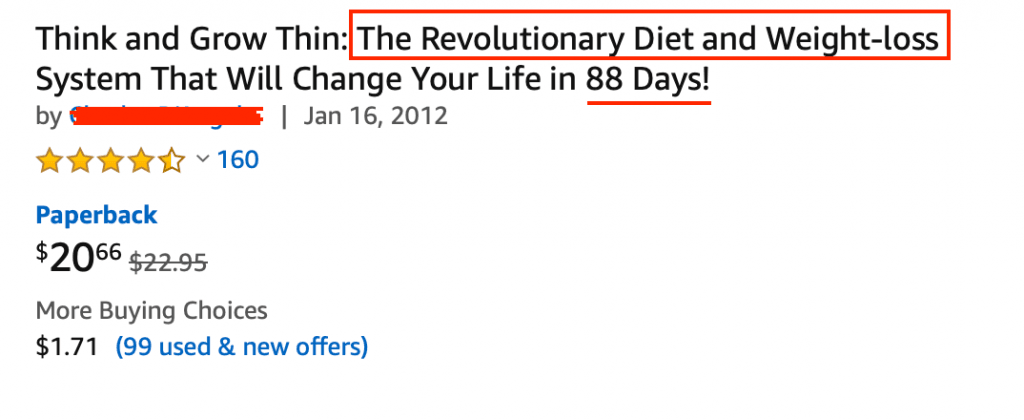
This is just marketing hyperbole and there is no regulation or standard definition of the terms “revolutionary” or “scientific breakthrough.” Chances are, if there really was a “revolutionary scientific breakthrough” you wouldn’t be hearing about it through an advertisement. In general, these are clear bullshit buzzwords that should be a tip-off to steer clear of whatever it is they’re selling.
“Scientifically or clinically proven?”
Buyer beware. As with phrases “revolutionary” or “scientific breakthrough,” “clinically proven” is also an unregulated and nebulously defined claim and can pretty much mean anything to anyone. It is common for health marketers to take legitimate research published in medical journals out of context and rewrite it to fit their marketing objectives. In the case of Laminine, the company provides a list of peer-reviewed scientific journal articles that, in actual fact, have absolutely nothing whatsoever to do with their product (which has not been tested against the claims they make).
“Cleanses” and “detoxes” that “support” organ functions or “may” (insert benefit)?
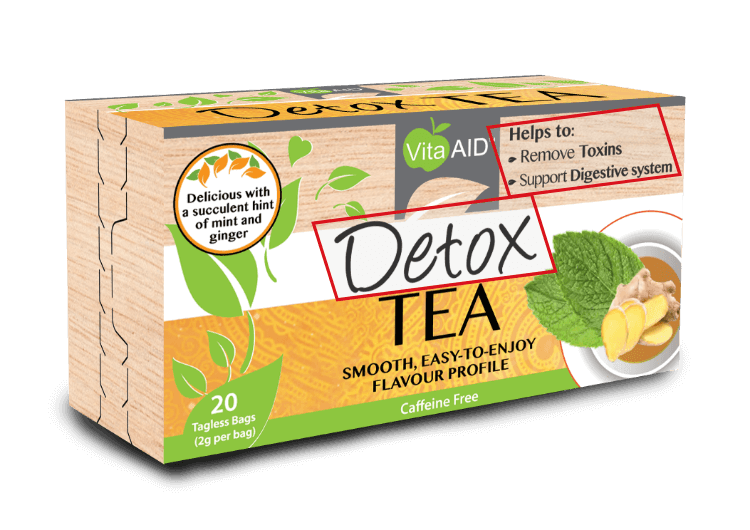
The terms “detox” and “cleanse” are popular marketing buzzwords and also bright red flags for bullshit. In virtually every case, the companies never specifically name any toxins. Provided you have a working liver and kidneys, then you’ve got all the natural detox fire power you need. And if you truly do have toxins in you that need removing, then you’re going to need a heck of a lot more than a “detox” tea. Be sure to check out my interactive Detox Decision-Making Tool here.
A magic ratio of protein to fat to carbohydrate is the key to health?
While many of the high fat, high protein, low carb diets are popular, they are neither new nor revolutionary. Every year there is a “new” version of an old keto diet claiming to hold the secret to health, weight loss, longevity, or whatever. While these sorts of diets do cause weight loss on the bathroom scale in the short term, it is extremely difficult to remain in ketosis for an extended period of time. Many keto style diets push for a high intake of animal protein which is known to be associated with diseases like heart disease and cancer and can result in a shorter lifespan.
While it is true that a bit of extra dietary protein helps provide a feeling of satiety (fullness), overdosing on protein does not confer additional benefits. Your body can convert the extra protein to fat or carbohydrate depending on physiological needs.
A Mediterranean style of eating provides the most value for health, weight management, and longevity. It’s high in fruits and veggies which also makes it high in fibre and disease-fighting phytonutrients, as well as low in highly-refined, processed junk food.
A single food or nutrient as a superfood or nutritional villain?

The idea that one single food or nutrient is “good” or “bad” is bad advice that misses the big picture of healthy eating. The reality is, we do not live on a single food or nutrient. Rather, we eat a varied diet that contains a wide selection of foods. If you tend to eat well on a regular basis, the occasional slice of birthday cake is not going to hurt you. Moreover, diet zealots that push this “good” vs “bad” or “clean eating” narrative are either selling something or do not have a basic understanding of the nutritional sciences.
Backed by Hollywood celebrities, TV chefs, and social media influencers?
Hollywood celebrities, TV chefs, and social media influencers are human billboards and mouthpieces for health and nutrition misinformation. They might be well-known and visible, but they are not trained health professionals that should be dispensing health, nutrition, and medical advice. Their opinions are just that, their own unqualified opinions.
Social media has also been linked to eating disorders. A research study out of the University of Pittsburgh surveyed 1765 adults aged 19 to 32 and found that those with the highest volume and frequency of social media use had the greatest risk of eating disorders. So next time you see Kim Kardashian shilling a detox tea on Instagram, you’ll know to ignore it.
Lots of weepy, over-acted emotional testimonials?
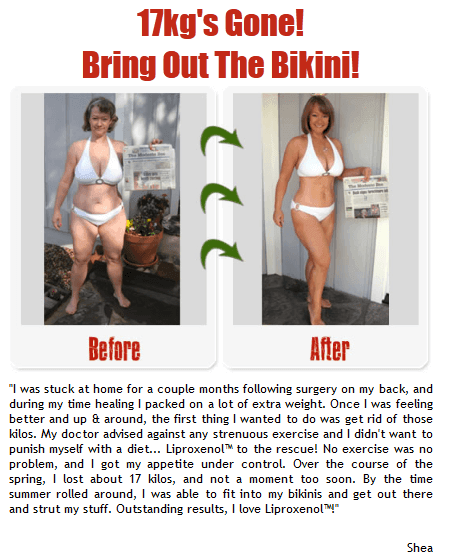
Testimonials are third-party validation that helps marketers get past your own innate bullshit detector. The testimonials are often phrased in a way that implies “hey, I’m just like you and had the same problems, but I tried it and ‘wow, look at me now!'” However, testimonials on the internet are notoriously unreliable and, as I showed in my Liproxenol expose, they’re sometimes just downright fabricated. TV infomercials have been exposed for using paid employees for testimonials or fabricating testimonials. Product reviews on Amazon are also notoriously suspect, with many of the “reviews” manufactured and engineered by dodgy marketers.
Get the “body of your dreams” or other lofty claims?
This is more marketing hyperbole you can ignore. It’s a formulaic marketing copywriter trick to dangle the dream in front of you and then present the oversimplified solution to solve your “problem.”
Getting healthy is “easy,” “no effort required,” or “just 5 minutes a day?”
There are no quick-fixes on the path to health. If it took you years to get unfit and unhealthy, then you certainly won’t reverse it with “just 5 minutes a day.” If it was easy to get fit and healthy, we wouldn’t have a global obesity problem. Everyone is looking for the golden unicorn of health, but the reality is that it takes hard work and discipline to make lasting healthy habit changes.
Gobbledygook jargon like “biosignature,” “gyrotronic resistance,” “quantum,” or similar?
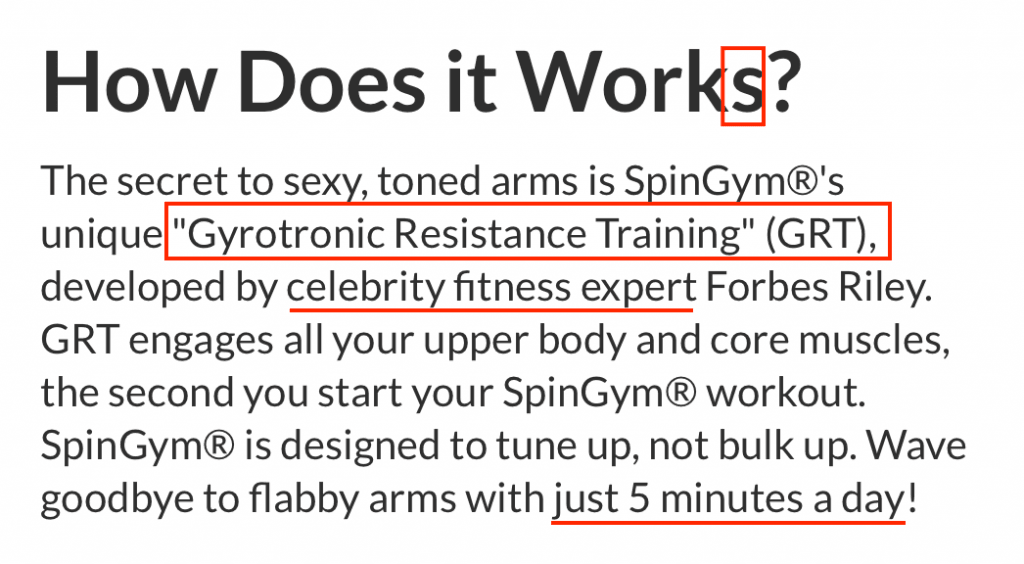
Marketer’s mantra: if you can’t convince them, confuse them. Health marketing commonly makes up its own pseudoscientific jargon or leverages on legitimate scientific terminology taken out of context to make a product or service seem more credible. But the reality is, all of these word salad bullshit phrases are meaningless and should be ignored.
“Use in conjunction with a sensible diet and exercise?” (i.e., infomercial product or detox/cleanse product)?
A lot of useless products tell you to exercise and eat better while using their product, but what they don’t tell you is that exercise and healthy eating alone without the product will deliver the same exact results. This tactic is grounded in the idea that you will erroneously credit the gimmick product rather than all your hard work and discipline exercising and eating better.
“Results not typical?”
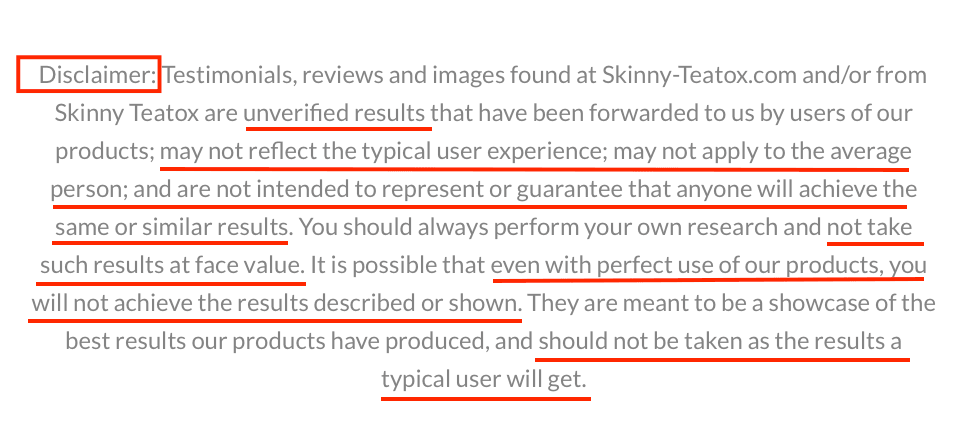
If the “results aren’t typical” then they’re deceptive and misleading. No matter what product or service is advertised, ALWAYS first seek out the disclaimer and look at the fine print. In most cases, unscrupulous health marketers pushing their detoxes and cleanses will tell you that the results aren’t typical and that the testimonials highlighted are best case scenarios.
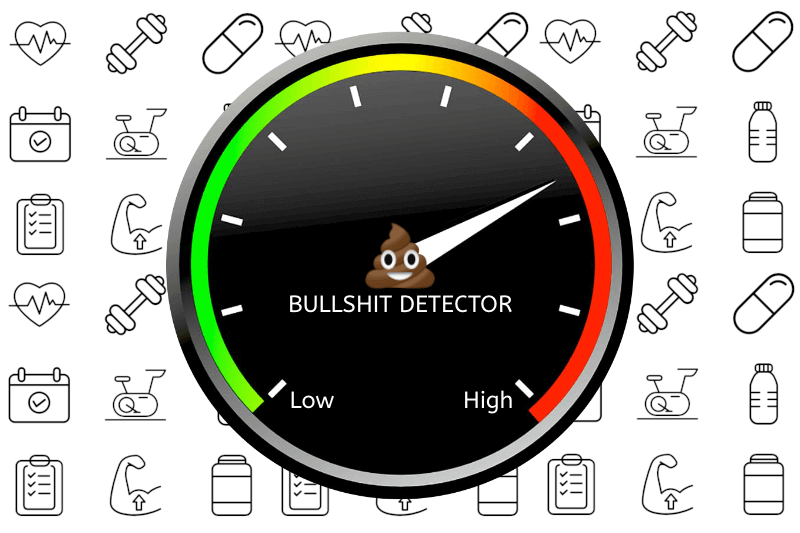
You should also add Cure and root cause
Nothing in reality is called that.
its called a treatment and has cavets.
What’s your opinion of Wonder Back pro.
Typical marketing hype.
What is your opinion on the SIRT FOOD DIET? Got the books and was going to get started : green juices with Matcha etc.
Have been doing Dr Michael Mosley 8-Week blood sugar diet – for 8 weeks ! and lost around a stone (diagnosed pre diabetic after blood analysis last year through GP : 77, female, 5’4 and 10 st 4 now – was 11 st 12 previously), together with walking around 5 miles, 5 times a week, mostly.
Mosley’s 800 cal/day is based on the Mediterranean diet with 3 meals/day and contains quite a few of the so called Sirt foods mentioned in the Sirt Food Diet Book.
It did mean cooking 3 meals a day from fresh ingredients but was never hungry, even after my long walks.
I am trying to get to 10 st and that is it, whilst continuing with the walks and possibly taking on “from couch to 5K”, eventually (tried it before and gave up).
Just wanted your opinion on the aforementioned diet and is it worth doing for the remaining 6-7 lbs left to lose.
Thank you for the advice
Hi Catherine,
There are a few things to consider here. You have to consider if a diet is sustainable over the long-term. Restrictive low-calories diets can be difficult to stick to over time and can often leave you feeling frustrated if you fall off the wagon. Despite the marketing hype, I don’t think that the Sirt Food diet in and of itself is the end-all be-all diet, but it’s just another commercial diet in the non-stop parade of diets that roll through every year. As I said above, if it’s something that you can stick with and it helps you incorporate lots of healthy, nutrient-dense foods into your diets (mainly veggies, fruits, quality grains, etc), then it may be a way forward for you.
While the Mediterranean Diet might have the word “diet” in the title, I view it differently than most other commercial diets. It’s more of a way of eating rather than a “diet” you go on JUST to lose weight. There are decades of epidemiological research that support the Mediterranean diet for good health and body weight management, with the latter more of a byproduct rather than the primary goal.
I’m also glad to see that you’re staying active with your walks. Exercise is something that can significantly help improve your body’s chemistry and physiology for the better and keep you healthy over the long-term (i.e, reduce the risk of diabetes, heart problems, etc).
The bottom line is that no matter which diet you decide to go with, you need to be brutally honest with yourself and ask yourself if this is something that is going to be sustainable. If it’s living hell and you’re really fighting the diet every day, then it’s unlikely that you’ll stick with it long enough to derive any long-term benefits (hence the reason I mentioned a Mediterranean style of eating).
Good luck with everything!